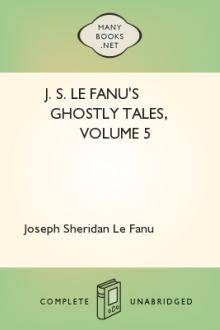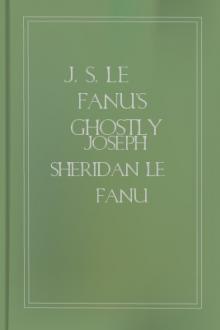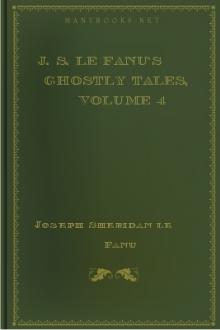J. S. Le Fanu's Ghostly Tales, Volume 5 - Joseph Sheridan Le Fanu (classic children's novels .TXT) 📗

- Author: Joseph Sheridan Le Fanu
- Performer: -
Book online «J. S. Le Fanu's Ghostly Tales, Volume 5 - Joseph Sheridan Le Fanu (classic children's novels .TXT) 📗». Author Joseph Sheridan Le Fanu
All these servants were diminutive, and ludicrously out of proportion with the enormous horses of the equipage, and had sharp, sallow features, and small, restless fiery eyes, and faces of cunning and malice that chilled the children. The little coachman was scowling and showing his white fangs under his cocked hat, and his little blazing beads of eyes were quivering with fury in their sockets as he whirled his whip round and round over their heads, till the lash of it looked like a streak of fire in the evening sun, and sounded like the cry of a legion of "fillapoueeks" in the air.
"Stop the princess on the highway!" cried the coachman, in a piercing treble.
"Stop the princess on the highway!" piped each footman in turn, scowling over his shoulder down on the children, and grinding his keen teeth.
The children were so frightened they could only gape and turn white in their panic. But a very sweet voice from the open window of the carriage reassured them, and arrested the attack of the lackeys.
A beautiful and "very grand-looking" lady was smiling from it on them, and they all felt pleased in the strange light of that smile.
"The boy with the golden hair, I think," said the lady, bending her large and wonderfully clear eyes on little Leum.
The upper sides of the carriage were chiefly of glass, so that the children could see another woman inside, whom they did not like so well.
This was a black woman, with a wonderfully long neck, hung round with many strings of large variously-coloured beads, and on her head was a sort of turban of silk striped with all the colours of the rainbow, and fixed in it was a golden star.
This black woman had a face as thin almost as a death's-head, with high cheekbones, and great goggle eyes, the whites of which, as well as her wide range of teeth, showed in brilliant contrast with her skin, as she looked over the beautiful lady's shoulder, and whispered something in her ear.
"Yes; the boy with the golden hair, I think," repeated the lady.
And her voice sounded sweet as a silver bell in the children's ears, and her smile beguiled them like the light of an enchanted lamp, as she leaned from the window with a look of ineffable fondness on the golden-haired boy, with the large blue eyes; insomuch that little Billy, looking up, smiled in return with a wondering fondness, and when she stooped down, and stretched her jewelled arms towards him, he stretched his little hands up, and how they touched the other children did not know; but, saying, "Come and give me a kiss, my darling," she raised him, and he seemed to ascend in her small fingers as lightly as a feather, and she held him in her lap and covered him with kisses.
Nothing daunted, the other children would have been only too happy to change places with their favoured little brother. There was only one thing that was unpleasant, and a little frightened them, and that was the black woman, who stood and stretched forward, in the carriage as before. She gathered a rich silk and gold handkerchief that was in her fingers up to her lips, and seemed to thrust ever so much of it, fold after fold, into her capacious mouth, as they thought to smother her laughter, with which she seemed convulsed, for she was shaking and quivering, as it seemed, with suppressed merriment; but her eyes, which remained uncovered, looked angrier than they had ever seen eyes look before.
But the lady was so beautiful they looked on her instead, and she continued to caress and kiss the little boy on her knee; and smiling at the other children she held up a large russet apple in her fingers, and the carriage began to move slowly on, and with a nod inviting them to take the fruit, she dropped it on the road from the window; it rolled some way beside the wheels, they following, and then she dropped another, and then another, and so on. And the same thing happened to all; for just as either of the children who ran beside had caught the rolling apple, somehow it slipt into a hole or ran into a ditch, and looking up they saw the lady drop another from the window, and so the chase was taken up and continued till they got, hardly knowing how far they had gone, to the old cross-road that leads to Owney. It seemed that there the horses' hoofs and carriage wheels rolled up a wonderful dust, which being caught in one of those eddies that whirl the dust up into a column, on the calmest day, enveloped the children for a moment, and passed whirling on towards Lisnavoura, the carriage, as they fancied, driving in the centre of it; but suddenly it subsided, the straws and leaves floated to the ground, the dust dissipated itself, but the white horses and the lackeys, the gilded carriage, the lady and their little golden-haired brother were gone.
At the same moment suddenly the upper rim of the clear setting sun disappeared behind the hill of Knockdoula, and it was twilight. Each child felt the transition like a shock—and the sight of the rounded summit of Lisnavoura, now closely overhanging them, struck them with a new fear.
They screamed their brother's name after him, but their cries were lost in the vacant air. At the same time they thought they heard a hollow voice say, close to them, "Go home."
Looking round and seeing no one, they were scared, and hand in hand—the little girl crying wildly, and the boy white as ashes, from fear, they trotted homeward, at their best speed, to tell, as we have seen, their strange story.
Molly Ryan never more saw her darling. But something of the lost little boy was seen by his former playmates.
Sometimes when their mother was away earning a trifle at haymaking, and Nelly washing the potatoes for their dinner, or "beatling" clothes in the little stream that flows in the hollow close by, they saw the pretty face of little Billy peeping in archly at the door, and smiling silently at them, and as they ran to embrace him, with cries of delight, he drew back, still smiling archly, and when they got out into the open day, he was gone, and they could see no trace of him anywhere.
This happened often, with slight variations in the circumstances of the visit. Sometimes he would peep for a longer time, sometimes for a shorter time, sometimes his little hand would come in, and, with bended finger, beckon them to follow; but always he was smiling with the same arch look and wary silence—and always he was gone when they reached the door. Gradually these visits grew less and less frequent, and in about eight months they ceased altogether, and little Billy, irretrievably lost, took rank in their memories with the dead.
One wintry morning, nearly a year and a half after his disappearance, their mother having set out for Limerick soon after cockcrow, to sell some fowls at the market, the little girl, lying by the side of her elder sister, who was fast asleep, just at the grey of the morning heard the latch lifted softly, and saw little Billy enter and close the door gently after him. There was light enough to see that he was barefoot and ragged, and looked pale and famished. He went straight to the fire, and cowered over the turf embers, and rubbed his hands slowly, and seemed to shiver as he gathered the smouldering turf together.
The little girl clutched her sister in terror and whispered, "Waken, Nelly, waken; here's Billy come back!"
Nelly slept soundly on, but the little boy, whose hands were extended close over the coals, turned and looked toward the bed, it seemed to her, in fear, and she saw the glare of the embers reflected on his thin cheek as he turned toward her. He rose and went, on tiptoe, quickly to the door, in silence, and let himself out as softly as he had come in.
After that, the little boy was never seen any more by any one of his kindred.
"Fairy doctors," as the dealers in the preternatural, who in such cases were called in, are termed, did all that in them lay—but in vain. Father Tom came down, and tried what holier rites could do, but equally without result. So little Billy was dead to mother, brother, and sisters; but no grave received him. Others whom affection cherished, lay in holy ground, in the old churchyard of Abington, with headstone to mark the spot over which the survivor might kneel and say a kind prayer for the peace of the departed soul. But there was no landmark to show where little Billy was hidden from their loving eyes, unless it was in the old hill of Lisnavoura, that cast its long shadow at sunset before the cabin-door; or that, white and filmy in the moonlight, in later years, would occupy his brother's gaze as he returned from fair or market, and draw from him a sigh and a prayer for the little brother he had lost so long ago, and was never to see again.
STORIES OF LOUGH GUIRWhen the present writer was a boy of twelve or thirteen, he first made the acquaintance of Miss Anne Baily, of Lough Guir, in the county of Limerick. She and her sister were the last representatives at that place, of an extremely good old name in the county. They were both what is termed "old maids," and at that time past sixty. But never were old ladies more hospitable, lively, and kind, especially to young people. They were both remarkably agreeable and clever. Like all old county ladies of their time, they were great genealogists, and could recount the origin, generations, and intermarriages, of every county family of note.
These ladies were visited at their house at Lough Guir by Mr. Crofton Croker; and are, I think, mentioned, by name, in the second series of his fairy legends; the series in which (probably communicated by Miss Anne Baily), he recounts some of the picturesque traditions of those beautiful lakes—lakes, I should no longer say, for the smaller and prettier has since been drained, and gave up from its depths some long lost and very interesting relics.
In their drawing-room stood a curious relic of another sort: old enough, too, though belonging to a much more modern period. It was the ancient stirrup cup of the hospitable house of Lough Guir. Crofton Croker has preserved a sketch of this curious glass. I have often had it in my hand. It had a short stem; and the cup part, having the bottom rounded, rose cylindrically, and, being of a capacity to contain a whole bottle of claret, and almost as narrow as an old-fashioned ale glass, was tall to a degree that filled me with wonder. As it obliged the rider to extend his arm as he raised the glass, it must have tried a tipsy man, sitting in the saddle, pretty severely. The wonder was that the marvellous tall glass had come down to our times without a crack.
There was another glass worthy of remark in the same drawing-room. It





Comments (0)